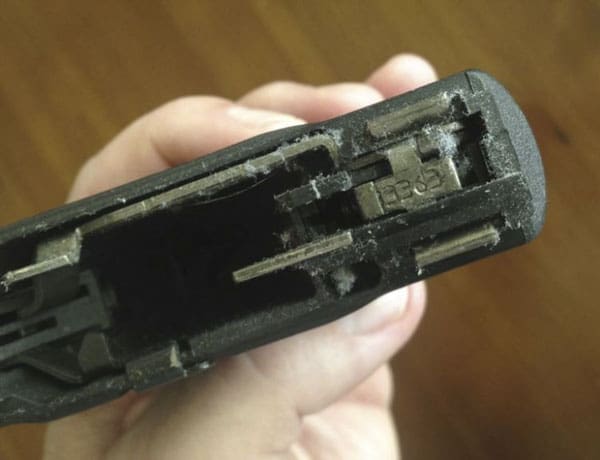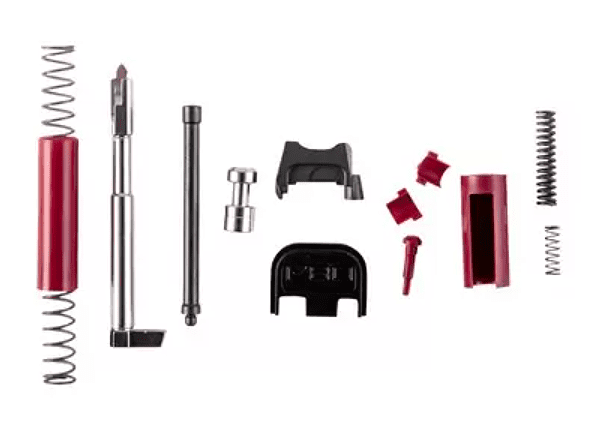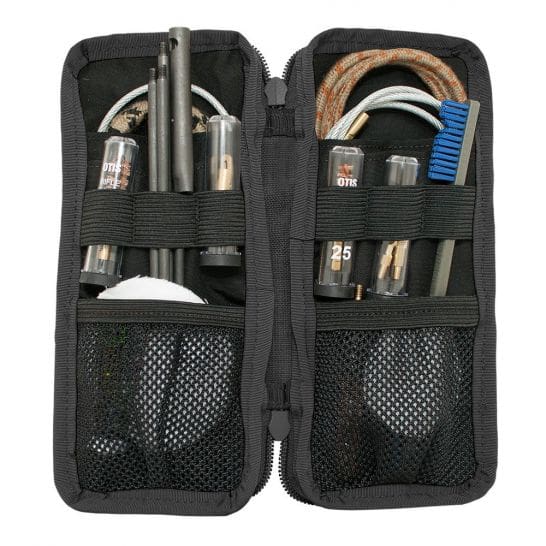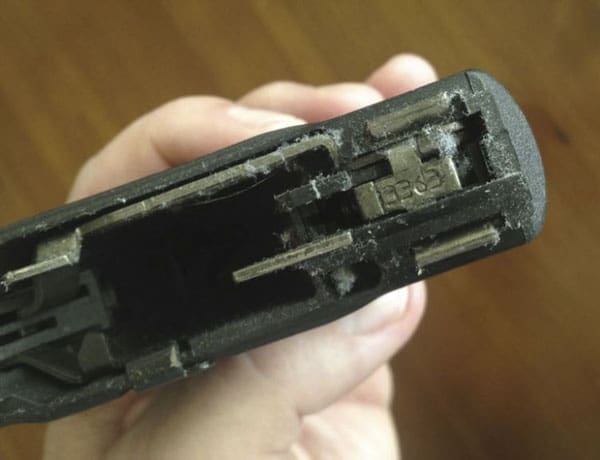
Should you clean your handgun after every use? Most modern-day service handguns are built to handle a tremendous amount of use and abuse. They’ll continue to function even when they’re filthy dirty. Just Google your favorite polymer pistol and the words “torture test.”
So why not wait for a leap year to clean your handgun? Or simply don’t clean it at all?
Most folks clean their handgun(s) because everybody tells them if they don’t the Baba-Yaga will come for them. They’re told that a dirty handgun is a hundred thousand times more like to malfunction than a squeaky-clean pistol. You’ll aim your filthy firearm at the bad guy and…CLICK.
That ain’t it.
While a clean gun is a happy gun — and yes, somewhat less likely to stop working than a dirty gun — as long as you keep it lubricated, the main issue you face is simple wear and tear.
Guns are mechanical objects. Mechanical objects degrade with use. Parts can and will give out. It’s only a matter of time. Maybe a lot of time. Maybe a little. But there’s no avoiding it. In some cases, when these small parts break, they render the weapon inoperable.
The real reason you should clean your handgun on a regular basis: so you can inspect small parts for normal or indeed abnormal wear and tear…to avoid a catastrophic failure when you really need your firearm.
Even the simplest handguns are relatively complex machines at their heart. When you have the important bits he bench in front of you, take a look for cracks in the plastic pieces, metal burrs developing or what looks like excessive wear. You can replace mission-critical parts before they give out.
A lot of folks reading this have no idea what parts they should be inspecting. While the basic concepts are similar across most types of handguns, they’re all slightly different.
You can find most modern service handgun owner’s manuals online. YouTube is lousy with gun-specific cleaning and maintenance videos (no guarantee as to their validity). Gun-specific forums can be a useful resource, too, as is a quick heart-to-heart with your favorite local gunsmith.
Once you figure out what replacement parts your handgun may need, I suggest keeping a small parts replacement kit in your range bag. If you have a mechanical problem away from home, you’ll have a chance to make it right and keep going.

[NB: Some manufacturers only sell spare parts at armory levels or require the user to ship them the handgun for repairs. If you can’t find, at the very least, a replacement recoil spring, you might want to question your purchase.]
I recommend creating a regular maintenance schedule. What’s an appropriate cleaning and inspection interval? That’s mostly down to round count.
Your round count at range sessions will vary. Sometimes you’ll only fire 50 rounds. Other times — say, during training — you might send 500 rounds downrange. Set a standard. After X rounds, I’ll clean and visually inspect my firearm for potential issues. For me that’s every thousand rounds.

That’s when I fully disassemble, clean, and inspect my everyday carry handgun. I replace any part I feel has reached the end or is near the end of its service life. (In between this interval, I oil the crap out of my guns. I put way more stock in a dirty gun properly oiled, than a clean gun with little to no oil.)
Take care of your gear and your gear will take care of you. Truly knowing your gear is the real secret. If you know and understand how your firearm operates — which parts do what, where they go and what they should look like — you have the ability to keep your handgun in its highest state of readiness.
Most gun owners don’t have the time or the inclination to gain the knowledge and practice the discipline required to properly maintain their handgun. It’s really not that hard. Don’t be that guy.
Jeff Gonzales is a former US. Navy SEAL and preeminent weapons and tactics instructor. He brings his Naval Special Warfare mindset, operational success and lessons learned to the world at large. He is the president of Trident Concepts in Austin, Texas.









My step dad is one of these. So I try to take him to the range often because I know he’ll clean after every trip.
But a good investment: A battery powered duster. You can find them all over. Mine is USB-C rechargeable, easy to take apart and clean the fan out, and exerts plenty of pressure.
I mainly bought it to clean PC’s with, but it’s proven useful for pretty much everything around the house. I will even use it on surfaces before vacuuming and then wiping things down.
I’ve never, ever, eh-vah seen any gun with even a fraction of the lint shown in the (many-times-reused-on-TTAG) photo above. But even so, I take my EDC with me every trip to the range and put a few mags’ worth of shots through it to keep frosty, even if the focus of that trip is on other guns. Then, of course, the EDC gets cleaned. So we’re talking every few weeks.
Anyone who allows their EDC to gather that much lint isn’t taking proper care of it, and I question their quality and quantity of training time with it as well. I wouldn’t want to be near that person if SHTF and he/she pulls that crusty old thing out of the holster…
I’ve seen that level of lint and grime in a good number of guns. Mostly seventy year old 22s and neglected muzzleloaders.
I’ve personally seen IWB Glocks accumulate that amount of lint in not a long amount of time for one reason –
Your body as you go about your day rubs against the clothes you wear, shedding off bits of lint from the cloth and tiny flakes of your skin. Exasperating it is the light film of oil POTG are known to leave on gun metals for corrosion protection.
I also have to wonder if on Glocks the constant wear of drifting out and re-seating the steel pins that hold the bits together erodes the polymer somewhat. At least on metal frame guns the split pins could get widened a bit if frame metal wears…
“Exacerbating”, perhaps you mean?
Mebbe it’s just me and those I associate with, but I still have never seen any lint in any guns. Certainly never in any of mine. But then, I take routine care of mine, so there’s that. I suppose there *are* those walking among us who are the ones forgetting where their guns even are, only to be pulled aside one day as they’re going thru the TSA checkpoint…
Carrying is a relatively new concept to many in California, while down here we’ve been doing it regularly for decades.
Perhaps that might explain it? The high humidity environment, maybe? ? ?
EDIT – Yup, my LCR in .357 in the ‘Sneaky Pete’ has some, too…
I pocket carried and my pistol had way more lint under the slide than that.
I also always cleaned before going to the range. Did you put it together correctly and there’s nothing going wrong?
I also don’t often put 500 rounds through any one gun in a year.
I clean my guns because it is fun. All the other benefits are simply ancillary.
“I clean my guns because it is fun.”
It can be a social thing if a group of us hits a local range. It’s a good opportunity to reflect on what guns we shot, and what things we didn’t like. And enjoy a hand-rolled tobacco stick and a refreshing beverage or 5 (only if not driving, that is)…
Like you, I enjoy the experience. One day, I may have to do a field-strip under a stressful situation, and having developed the muscle memory will make that a more-or-less automatic response…
Anyone who doesn’t keep and maintain their weapons are pure lazy. It’s the same people who have corrosion all over their vehicles battery, haven’t changed their oil in god knows how long and they have all these idiotic excuses as to why. Those of us who do maintain and take pride in our possessions don’t need to hear those excuses. We’ve heard them all before.
If you take care of your equipment, it will take care of you and preventive maintenance is far cheaper than repair.
If you don’t take care of your stuff, well sucks to be you.
Props on the screen name!
Easy to take care of a gun or two…but harder to take care of a hundred plus guns in multiple states. Not that I have that, mind you, but still.
I clean on a quarterly cycle with regular maintenance. For guns that get fired they get cleaned after firing.
Years ago, an episode of the original CSI (the one based in Las Vegas) showed Grisham inspecting a gun that was being collected under warrant as suspected evidence. As he looked down through the chamber, he pursed his lips and gave the homeowner a look of suspicion while stating, “This gun has been cleaned”.
The owner gave him a “well, duh” look and flatly replied with, “Of course I cleaned it. I inspect and clean it after every trip to the range. Don’t you clean yours?”
Haz:
Years back I took a revolver into my LGS as a trade-in for a new 1911. The owner (then semiretired) picked it up and inspected it. Then he said out loud, “I see you are from the old school. This gun is CLEAN.” At first, I wondered what he was going on about until I realized that he was talking to me. I kept my mouth shut, but I was thinking, “What’s so remarkable about that?”
Ditto.
I like the concept of cleaning relatively often as a gateway to checking for wear or failures.
My cousin had a “safe queen” revolver that was something like 10 years old. One day he took it out of the safe to dry-fire it and … nothing. It would not advance the cylinder and dry-fire. He disassembled it and found that an internal spring had disintegrated. While he would not have typically disassembled and looked for failed springs, he would have noticed much sooner when the spring failed. And that is really important if he was going to carry that for self-defense.
On new revolvers, I make a point to ‘pop the hood’ and get at the innards to make sure the small bits get a corrosion inhibitor of some sort on there…
Geoff PR,
That sounds like an excellent practice. I think I am going to adopt it myself.
And meanwhile, I am feeling compelled to open up my existing revolvers to apply rust inhibitor to the innards.
Waitaminute…
A relatively new gun only 10 years old that was treated like a queen and seldom saw any action had its factory component (a metal one, at that) simply “disintegrate”?
@ I Haz
Yeah that sounds fishy. if anything, the humidity was out of whack in the safe, lacking a safe heater or other device. I had to warn a friend of mine about that when I helped him move a new safe into this unheated portion of a bedroom closet in a house that was built in 1905. I told him he HAD to get humidity control in that thing and monitor it otherwise the potential for his guns getting ruined including a nice pre-1964 Winchester 30/30 is certainly possible.
My larger safe is an old-school model (heavy tumbler, no electronics or interior light/heater). My form of humidity control is a set of large desiccant cans (the ones with pellets that change color when they need to be recharged) that I swap out every few weeks.
I have a pre-64 Win .30-30 inside that I’m planning on fully restoring.
Even with the desiccant, I’d be inclined to park a 10 watt bulb in there, out of rust paranoia, if anything…
I Haz a Question,
That is exactly correct–and quite disturbing of course.
I suppose it could be humidity in his safe: I don’t think he does anything to control it, although I am not entirely sure that it would be necessary. While our summers can be quite humid at times, a good chunk of our Spring and Fall and all of our Winter is very dry.
I clean my gats so they work. Nothing mystical or profound.
Since I have a fair collection of firearms, some of them come out of the safe once or twice a year. Even so, they get stripped and cleaned a couple times a year if for no other reason than to prevent possible corrosion and to keep any dust or crud from building up.
The dozen or so firearms that see more regular use, get cleaned about once a month. Or if actually used right before they get returned to lock up.
And it’s best to spot corrosion as early as possible so it can be dealt with…
Hang a small square of mild steel in your gun safe. If it starts to show rust, you’ve got a humidity issue. Pennies on top of your ammo cases help catch corrosion early also. Just make sure they’re clean and dry before installing, and don’t handle them with bare hands.
I like the steel idea, thanks!
The steel idea is very good but I use these:
https://www.amazon.com/Desiccant-Dehumidifier-Absorbing-MIL-D-3463E-Absorbents/dp/B074FBHT2Z
Those and a good wipe down with a silicone cloth keeps the rust away.
A big no-no is the safe or safes in a unheated garage, the temperature swings cause all kinds of humidity. I will try the steel thing but I really have never had a rust issue. I had some WWBs that turned pretty funky while all the other ammo was fine It was the brass and copper bullets so I shot them. No green on the copper and no problems. I have no idea what happened to them, I think whatever it was happened before I bought them. Who looks in cardboard range ammo boxes when they buy them?
(In between this interval, I oil the crap out of my guns. I put way more stock in a dirty gun properly oiled, than a clean gun with little to no oil.)
Oil attracts and holds dirt. Dirt adds friction (counter to the purpose of oil), and abrades plastic and metal. Excessive oiling leads directly to dirt-related failures, and indirectly to premature component wear.
If you over-oil your gun you will have a dirty, worn-out gun.
Yes, sometimes the only way to finish the match (or whatever) is to scrape out all the sludge you can, hose it down with CLP, and make a solemn vow to clean it promptly at the earliest opportunity. Desperate times call for desperate measures, but that’s not a viable SOP.
Your statement confirms the author’s…
“Yes, sometimes the only way to finish the match (or whatever) is to… hose it down with CLP”
is the literal description of
“a dirty gun properly oiled”.
“Oil attracts and holds dirt.”
Correct, and why I use Eezox as a cleaner-lube on mine.
When it dries, the resulting protective film won’t attract and hold crap anywhere near as much as a lightly-filmed oiled surface…
Has anyone ever used frog lube? If so, how did it work?
Sucks
For rifles look up “bore copper saturation.” After a rifle bore (say .308) has had 100-200 shots through all the micro cracks, pits, and dents from manufacturing get filled with copper from the bullet jackets (bore copper saturation). From this point the barrel doesn’t get much more dirty and kind of self cleans like rifle suppressors do. The bullet velocity will slightly increase and because the barrel fouling has plateaued there’s less internal changes shot to shot in the barrel and thus is most accurate at that time. You get to maybe 600-700 rounds and shots start to open up again, clean it and start over. It pays to put your rifles up dry. FM23-10
The only problem with that is that copper corrodes relatively easily, and the copper oxide itself can be abrasive and can cause barrel erosion…
You have to have moisture for that.
Moisture is *everywhere*, the amount can vary…
Kind of self cleans? Wut?
I love the smell of Hoppe’s No. 9 in the morning.
That gun has more lint in it then in my dryer vent screen.
It’s like a TTAG dirty movie. I find it disturbing.
“It’s like a TTAG dirty movie. I find it disturbing.”
Do you suppose in the dark and privacy of your gun safe, your guns are having fun? 😉
https://www.youtube.com/watch?v=_YyTp9swrso
Perhaps but it’s good clean fun.
I’m OCD about cleaning my guns.
Seldom does 24 hours pass after a complete cleaning after shooting.
My dad was a big proponent of silicone cloths.
About once a month I will wipe down every gun in my safe.
I might need therapy. 😁
Did you ever see the sequel — “Debbie Duz Dishes?”
“Debbie is now forced to live the the life of a common housewife; during the movie Debbie gets freaky with common household items like a vacuum, along with home service workers and almost anyone to avoid doing the dishes.”
I wonder if she does windows? I hate doing windows.
I agree, I can’t stand cleaning windows but with two German Shepard’s which are always looking out, it’s a lost cause slobber and nose prints Another thing is flat screen TVs they shake their toys and the spit flies.
The household agreement is wife does the windows and TVs once a week and I will vacuum once a week but I try and put off for two which NEVER works. Besides GSDs shed like the lint gun picture, that gun could have been spotless an hour before but if it was in the same room with the “German Shedders” it could look like that.
Dishes are easy, she loads the dishwasher and I empty it.
Well, I recently bought an 03-A3 made in 1921. After using an entire can of solvent to get off the old Cosmoline (SP) I cleaned out the stock and got a huge amount of sawdust. To be honest, it was working just fine before I cleaned it, so I think once every 100 years is also a reasonable possibility.
I have a few firearms that I would not shoot today, only because of age and finding the proper loads is an exercise in futility. They are still cleaned yearly, not because I need them to work, because they are family heirlooms that I am responsible for.
My more modern firearms are cleaned after every range use. My edc is field stripped and checked weekly and after the range I go deep into it. I hate dirty firearms, blame my Grandfather, my drill sgt had nothing on the old man when it came to firearms or tools being kept clean and orderly.
My new acquisition will get a good clean and go over before I take it to the range. It is new and a Henry so I expect it to be correct. But there is always a possibility something isn’t right, very slim, but still possible.
Good to see you again. Been a very long time since I last remember reading a comment from you.
I have been mostly in read mode. Spent a lot of time tracking down my Henry.
My firearms are kept squeaky clean, lubed and ready. If it’s not a weapon assembled from stripped receivers and were store bought like Sars, Glocks, Shotguns, etc. they are taken completely apart, cleaned, painstakenly tweaked and reassembled, tested for utmost reliability and stored. If you own firearms and want them clean an air compressor helps a bunch.
I’m always cleaning pubes off my weapon. Maybe my IWB is riding too low.
I just picked up a used stainless steel barrel Marlin Model 60 at a local auction, the barrel wasn’t fouled but inside the receiver it was caked with unburnt powder and shavings, every damn nook & cranny was pavked solid. Of course I knew it needed some TLC when I bid on it (winning bid $40), the bolt was difficult to operate (I correctly diagnosed it as a broken plastic buffer/replacement ordered from Numrich). It took a couple hours to clean with Hoppes, toothbrushes, and picks but for the life of me I can’t understand how someone could let it get that way. Oh well I got it cheap and now it will be well-cared for.
After I work out, I shower.
After a trip to the range, I clean my gunm.
I clean my M and P 2.0 compact after every single range trip. It has gone over 23,000 rounds without a single stoppage (yes I count every single round) …..No stove pipes no double feeds …nothing. CLEAN. YOUR. GUN.
Gunms are like a cars ash tray, when it gets dirty its time to swap it off and get a new Gnu.
,,,,,,well we know that’s bullshit because cars dont have ashtrays no more.
I clean the barrel and cylinder after each shute, total strip downs about twice a year or depending on how much Jimi Hendrix I listen too.
It’s time to clean them when there’s too much purple haze in the pipe?
I never clean my guns. There I said it. No, I don’t have any shame. I’ve also never had a gun fail due to no cleaning.*
*This does not include break in periods which I have occasionally had to clean and shoot a gun a few hundred times to work properly when new.
A decade ago, while testing potential EDC candidates at the local gun range, I field-stripped a G27 rental. It was filthy. However, it was also totally accurate. Snappy, but accurate.
Upon returning the firearm to the range desk, I commented:
Me: this firearm is filthy. How often do you clean it?
Dude: Whenever they fail.
Me: How often do they fail?
Dude: Haven’t cleaned one yet.
Me: (Pointing to the Glock in his holster) How often do you clean YOUR Glock?
Dude: Every time I shoot.
I bought a G27. … and a few others.
Don’t get too crazy about cleaning. Was at the range a few days ago with my G27 EDC. It’s good to 25 yards and beyond. In the next few days, I’ll scrub the carbon from the chamber and leade – but only because I think it needs it.
My replacement parts kit is a second gun!
Maintenance is all about the wear and tear for me and I’m pretty admittedly obsessive about it. I clean my guns every time I shoot them. And those I don’t shoot frequently are cleaned on a quarterly basis. Just the way I was raised – take good care of your tools and they’ll take good care of you.